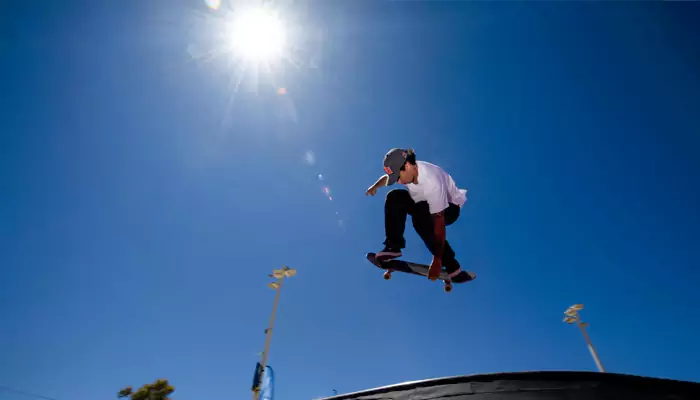
These events range from cool to quirky!
Explore the overlooked realms of the Olympics, where attention may be dimmer, but the thrill remains palpable. While swimming and gymnastics bask in the spotlight, an array of Olympic sports beckons for discovery. From the adrenaline-pumping excitement of roller speed skating to the awe-inspiring feats of breakdancing, these sports stand as the mavericks of the Games, flourishing in the shadows of obscurity. Embark on a voyage where athletes surpass norms, engaging in disciplines that will leave you clamouring for more.
Originating from California's waves and streets in the 1950s, skateboarding emerged as a thrilling symbol of freedom and defiance. Initially embraced by surfers aiming to replicate the ocean's thrill on land, by the 1980s, it had become entrenched in underground culture, embodying values of uniqueness and boundary-pushing. At Tokyo 2020, elite skateboarders showed their skills in park and street disciplines, navigating dynamic courses filled with bowls and bends, executing gravity-defying tricks. Judges scrutinised every move, rewarding creativity and technical perfection. Skateboarding's Olympic debut celebrated its evolution, innovation, and individuality, captivating a global audience.
Marathon swimming, an exhilarating Olympic discipline introduced at the 2008 Beijing Games, challenges athletes with a demanding 10-kilometre course in open waters. Originating from the early days of the Olympics, when all swimming events occurred in natural waters, the sport resurfaced in 1991 at the FINA World Swimming Championships, featuring a gruelling 25-km contest lasting over five hours. By 2001, the 10-km race had joined the fray. Against the backdrop of seas, rivers, and lakes, marathon swimming tests athletes' physical and mental resilience as they navigate shifting tides and currents, culminating in a nail-biting sprint finish after approximately two hours of swimming.

The Gold Medal Winner for Marathon Swimming
Breaking, also known as breakdancing, made its Youth Olympic Games debut in Buenos Aires in 2018 and is set to feature at the Paris 2024 Olympics. Originating in the Bronx, New York, during the 1970s, breaking evolved from street block parties into a cornerstone of hip-hop culture. Its inclusion in the Olympics marks a significant milestone, elevating it from street culture to a recognised sport. The Paris 2024 competition will demonstrate separate events for men and women, with 16 B-Boys and 16 B-Girls engaging in dynamic solo battles. Judges assess dancers on creativity, technique, and musicality, amid discussions on maintaining authenticity amidst the Olympic journey.
Surfing traces its roots back to Peru and Polynesia, with documented evidence found in Hawaii by James King in 1779. Duke Kahanamoku, a Hawaiian icon and three-time Olympic champion, advocated for surfing's inclusion in the 1920s, culminating in its debut at Tokyo 2020. The International Surfing Association (ISA) and World Surf League (WSL) collaborated to shape the competition, featuring 40 surfers in the shortboard division. Paris 2024 awaits surfing's encore at Teahupo'o in Tahiti, displaying the sport's ever-growing global popularity from July 27th to August 4th.
Ski mountaineering, fondly called "skimo," is a thrilling event you can't afford to overlook! Competitors skillfully ski up and down snow-covered mountains, tracing its roots to Nordic peoples who crafted skis for efficient snowy travel. Modern ski mountaineering began with Wilhelm Paulcke's alpine traverse in 1897, gaining global acclaim with international events across continents. After a 78-year hiatus, ski mountaineering returns to the Olympic stage at Milano Cortina 2026, featuring men's and women's sprint races and a mixed relay event. Governed by the International Ski Mountaineering Federation (ISMF), the sport attracts athletes from diverse backgrounds, highlighting its unique blend of physical challenges and mountain exploration.
The Olympics give a global stage to these sports, which already hold cultural relevance for a certain group of individuals, making these events a global celebration.